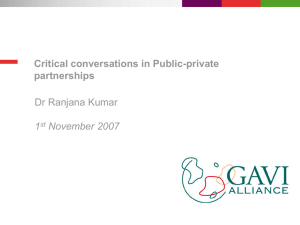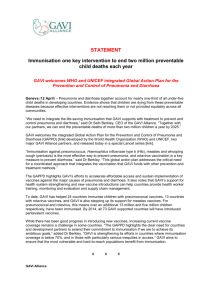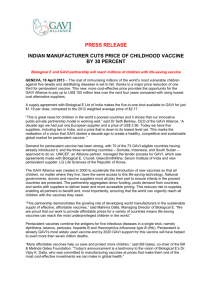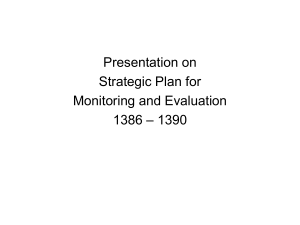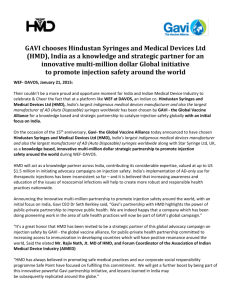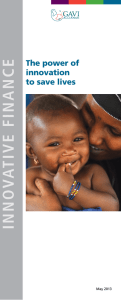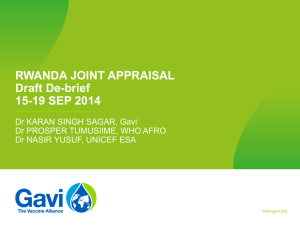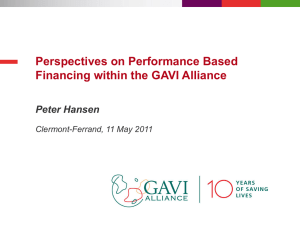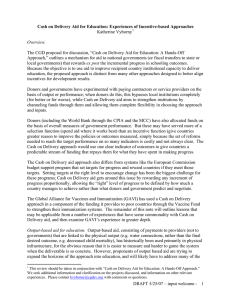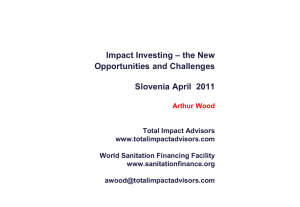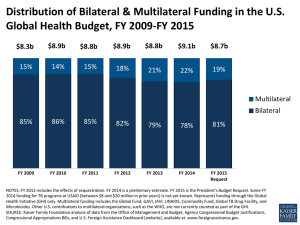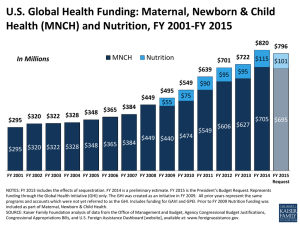GAVI Alliance Board up-date on policies and
advertisement
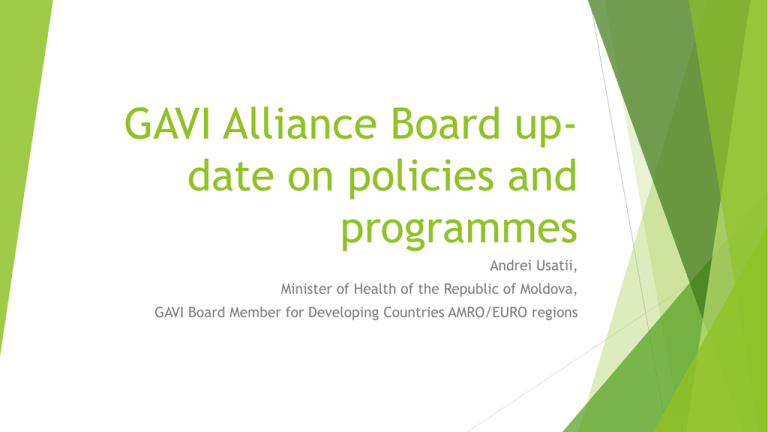
GAVI Alliance Board update on policies and programmes Andrei Usatii, Minister of Health of the Republic of Moldova, GAVI Board Member for Developing Countries AMRO/EURO regions Mission and strategic goals 2011–2015 To save children’s lives and protect people’s health by increasing access to immunisation in poor countries 1 The vaccine goal Accelerate the uptake and use of underused and new vaccines 2 3 The financing goal Increase the predictability of global financing and improve the sustainability of national financing for immunisation 4 The health systems goal Contribute to strengthening the capacity of integrated health systems to deliver immunisation The market shaping goal Shape vaccine markets to ensure adequate supply of appropriate, quality vaccines at low and sustainable prices Board Composition 18 "representative" seats UNICEF WHO World Bank Bill & Melinda Gates Foundation Governments Industrialised Countries (5) Governments Developing Countries (5) Vaccine Industry Industrialised Countries Vaccine Industry Developing Countries Research & Technical Health Institutes Civil Society Organisations 9 "unaffiliated/independent" seats GAVI CEO (non-voting) 4 GAVI governance – a mix of public and private Board Nomination – appointed in December 2012 (for 3 years period of time) 2012-2015 Operate in good faith in the best interests of the GAVI Alliance Ensure a strong advocacy role To exercise care in the performance of the duties Keep fully informed of the GAVI Alliance activities and strategic plans Ensure commitment of the developing countries that implement GAVI programmes Consult the policies and documents with the constituencies before their approval at GAVI Board Inform countries about Board Decisions Represent constituencies interests and concerns with reference to the policies adopted. Board Committee Structure Developing country governments constituency for EURO/AMRO regions Andrei Usatii (Representative) from Moldova and Bheri Ramsaram (Alternate) from Guyana represent these GAVI – eligible/graduating countries (14). Armenia* Azerbaijan* Bolivia* Cuba* Georgia* Guyana* Haiti Honduras* Kyrgyz Republic Moldova* Nicaragua* Tajikistan Ukraine* Uzbekistan* Constituencies aspects The main challenge characteristic for both regions is that 11 out of 14 countries are in graduating phase It is hard to advocate the interests of the constituency at GAVI Board when the main majority are not eligible for new support Lack of commitment for consultation process from the countries (lack of inputs from country level) Exchange of experience and lessons learned between the two regions Main challenges from the constituency perspective Financial affordability (other donors also phasing out from LMICs like Global Fund and GAVI is the main or last donor for vaccine support) Insufficient advocacy efforts to mobilize additional resources, accompanied with weak planning and budgeting process Access to quality-assured vaccines at an optimum and affordable price (self-procurement mechanism) for EURO region Policies approved by GAVI Board with impact on the constituencies: GAVI engagement with graduating countries (BM, November 2013) GAVI Alliance Strategy 2016-2020 (BR, April 2014) Polio and routine immunization ( BM, November 2013) GAVI’s supply chain strategy ( BM June 2014) Vaccine investment strategy (BM, November 2013) Polio and Routine Immunization Part of the Endgame Strategy for 2013-2018 The Board approved to support with IPV all GAVI eligible countries, regardless their graduation status. No co-financing requirements Eligibility for IPV support is not opening the window for other vaccines introduction in graduating countries. In 2018, the Board will decide on co-financing requirements. GAVI engagement with graduating countries GAVI engagement with graduating countries was approved at the last GAVI Board Meeting, held in November 2013 with a lot of resistance from donors. In their opinion the financial and programmatic sustainability is a responsibility from the Government side. Several round tables have been organized with donors and discussions have been held in order to demonstrate how critical this additional support is to ensure gains achieved with GAVI support post-graduation. A new framework for assessing all graduating countries was piloted in 3 countries (Honduras,Moldova and Papua New Guinea) in Q1 2014. At the PPC meeting in May 2014 the experience from the 3 countries were shared and it was agreed to proceed with all graduating countries. GAVI Strategy for 2016-2020 The consultation process is still on-going. A lot of discussion on changing the eligibility threshold and/or inclusion of other eligibility indicators, besides GNI per capita like, access, equity, coverage issues, etc. The mission and objective remains the same Long-term visions 30 countries will still be eligible by 2030 for full GAVI support Coverage and equity Plans and commitment Expand GAVI engagement with graduating countries to all GAVI graduating countries GAVI support for access to appropriate pricing for GAVI graduates & other LMICs Review of the co-financing policy (later in 2014) Graduation policy Eligibility policy Sustainable Immunization Financing Sabin Vaccine Institute Programme “Sustainable Immunization Financing”: Eastern Europe region: project will be Implemented in 4 countries: Uzbekistan, Georgia, Armenia and Moldova Thank you GAVI/2011/Ed Harris
